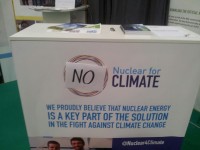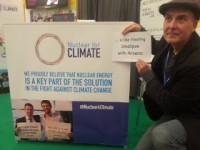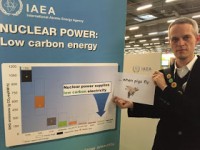 On day eight, our small stand in the UN conference Blue Zone was vandalized. We later found a blog where the offenders posted a string of photos of themselves holding up various anti-nuclear signs next to the Nuclear for Climate logo.
On day eight, our small stand in the UN conference Blue Zone was vandalized. We later found a blog where the offenders posted a string of photos of themselves holding up various anti-nuclear signs next to the Nuclear for Climate logo.
Their biggest complaint? That nuclear supporters were far too visible at the COP meeting for their comfort.
There were four pro-nuclear booths in two locations at the venue - the International Atomic Energy Association (IAEA) and Nuclear for Climate in the UN Zone, and Nuclear for Climate and the U.S. Department of Energy in the Solutions gallery. Among us we hosted a number of panel discussions about the need for nuclear energy as one of the climate solutions, as well as new technologies on the horizon. Department of Energy Secretary Ernest Moniz actively promoted nuclear energy during his stay, including giving the keynote address at an advanced nuclear technology panel, moderated by Dr. Kemal Pasamehmetoglu, Director of the Gateway for Accelerated Innovation in Nuclear (GAIN) project out of the Idaho National Lab.
We also had a strong social media and media presence over the past two weeks. This was thanks to most of the organizations we were working with having communications specialists on hand, and the advocates outside the nuclear industry who have developed clear, strong messages in support of nuclear energy.
 And lest you think we were solely on a PR mission, we were paying attention to the negotiations as well. While it became clear very quickly that we would have no real influence over the agreement, we were pro-active nonetheless. When new language appeared that would specify the use of renewables in Africa, ANS President Gene Grecheck and I sought out the U.S. delegation and expressed our concern about such specific language. The Deputy Director of the U.S. Office of Global Change told us that they were at the point in the negotiations when specific language such as that was unlikely to be altered, however, he felt that such language would not prevent Africa from pursuing nuclear energy. Whether that will be the case in practice remains to be seen. Ironically, representatives of many African nations stopped by our stand for information, including a senior official in the Office of the Deputy President of Kenya.
And lest you think we were solely on a PR mission, we were paying attention to the negotiations as well. While it became clear very quickly that we would have no real influence over the agreement, we were pro-active nonetheless. When new language appeared that would specify the use of renewables in Africa, ANS President Gene Grecheck and I sought out the U.S. delegation and expressed our concern about such specific language. The Deputy Director of the U.S. Office of Global Change told us that they were at the point in the negotiations when specific language such as that was unlikely to be altered, however, he felt that such language would not prevent Africa from pursuing nuclear energy. Whether that will be the case in practice remains to be seen. Ironically, representatives of many African nations stopped by our stand for information, including a senior official in the Office of the Deputy President of Kenya.
 I also heard from someone who had been to many COPs before, who said he had never seen nuclear so well-represented and visible before. The needle moved just a bit for nuclear in Paris. Apparently the anti-nuclear folks who were used to having the playing field mostly to themselves didn't like us treading on their turf. They will need to get used to it. Those of us gathered there will be looking at our next steps in a collaborative communications effort.
I also heard from someone who had been to many COPs before, who said he had never seen nuclear so well-represented and visible before. The needle moved just a bit for nuclear in Paris. Apparently the anti-nuclear folks who were used to having the playing field mostly to themselves didn't like us treading on their turf. They will need to get used to it. Those of us gathered there will be looking at our next steps in a collaborative communications effort.
Tari Marshall is the Director of Communications and Outreach at the American Nuclear Society.


 On day eight, our small stand in the UN conference Blue Zone was vandalized. We later found a blog where the offenders posted a string of photos of themselves holding up various anti-nuclear signs next to the Nuclear for Climate logo.
On day eight, our small stand in the UN conference Blue Zone was vandalized. We later found a blog where the offenders posted a string of photos of themselves holding up various anti-nuclear signs next to the Nuclear for Climate logo. And lest you think we were solely on a PR mission, we were paying attention to the negotiations as well. While it became clear very quickly that we would have no real influence over the agreement, we were pro-active nonetheless. When new language appeared that would specify the use of renewables in Africa, ANS President Gene Grecheck and I sought out the U.S. delegation and expressed our concern about such specific language. The Deputy Director of the U.S. Office of Global Change told us that they were at the point in the negotiations when specific language such as that was unlikely to be altered, however, he felt that such language would not prevent Africa from pursuing nuclear energy. Whether that will be the case in practice remains to be seen. Ironically, representatives of many African nations stopped by our stand for information, including a senior official in the Office of the Deputy President of Kenya.
And lest you think we were solely on a PR mission, we were paying attention to the negotiations as well. While it became clear very quickly that we would have no real influence over the agreement, we were pro-active nonetheless. When new language appeared that would specify the use of renewables in Africa, ANS President Gene Grecheck and I sought out the U.S. delegation and expressed our concern about such specific language. The Deputy Director of the U.S. Office of Global Change told us that they were at the point in the negotiations when specific language such as that was unlikely to be altered, however, he felt that such language would not prevent Africa from pursuing nuclear energy. Whether that will be the case in practice remains to be seen. Ironically, representatives of many African nations stopped by our stand for information, including a senior official in the Office of the Deputy President of Kenya. I also heard from someone who had been to many COPs before, who said he had never seen nuclear so well-represented and visible before. The needle moved just a bit for nuclear in Paris. Apparently the anti-nuclear folks who were used to having the playing field mostly to themselves didn't like us treading on their turf. They will need to get used to it. Those of us gathered there will be looking at our next steps in a collaborative communications effort.
I also heard from someone who had been to many COPs before, who said he had never seen nuclear so well-represented and visible before. The needle moved just a bit for nuclear in Paris. Apparently the anti-nuclear folks who were used to having the playing field mostly to themselves didn't like us treading on their turf. They will need to get used to it. Those of us gathered there will be looking at our next steps in a collaborative communications effort.